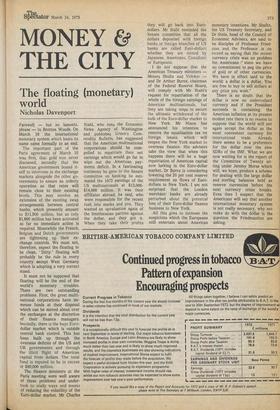The floating world (monetary)
Nicholas Davenport
Farewell — but no laments, please — to Bretton Woods. On March 16 the international monetary system which bears its name came formally to an end. The important part of the Paris agreement of March 16 was first, thai. gold was never discussed, secondly that the American government bound it self to intervene in the exchange markets alongside the other governments to ensure an orderly operation so that rates will remain close to their existing levels. This may involve an extension of the existing swap arrangements between central banks, which presently amount to $11,500 million, but as only $1,600 million has been activated so far no immediate action is required. Meanwhile the French, Belgian and Dutch governments are tightening up their exchange controls. We must not, therefore, expect the floating to be clean. ' Dirty' floating will probably be the rule in every country except West Germany which is adopting a very correct stand.
It must not be supposed that floating will be the end of the world's monetary troubles.
There are two outstanding problems. First, the great multi national corporations have im mense funds at their disposal which can be moved about over the exchanges at the discretion of their finance managers. Secondly, there is the huge Euro dollar market which is outside central bank control. This has been built up through the overseas deficits of the US and UK governments and through the illicit flight of American capital from dollars. The total fund is reputed to be in excess of $80,000 million.
The finance ministers at the Paris meeting were well aware of these problems and undertook to study ways and means of reducing the volatility of the Euro-dollar market. Mr Charles Stahl, who runs the Economic News Agency of Washington and publishes Green's Commodity Bulletin, has suggested that the American multinational corporations should be compelled to repatriate their net earnings which would go far to wipe out the American payments deficit. In a fascinating testimony he gave to the Senate committee on banking he estimated the 1972 earnings of the US multinationals at $12,000$14,000 million. It was their affiliates abroad, he said, who were responsible for the recent rush into marks and yen. They wanted an upvaluation again of the Smithsonian parities against the dollar, and they got it. When they take their profits they will go back into Euro dollars. Mr Stahl reminded the Senate committee that all the dollars deposited with foreign banks or foreign branches of US banks are called Euro-dollars whether they are owned by Japanese, Americans, Canadians or Europeans.
I do not suppose that the American Treasury ministers — Messrs Shultz and Volcker — and Dr Arthur Burns, chairman of the Federal Reserve Board, will comply with Mr Stahl's request for repatriation of the whole of the foreign earnings of American multinationals, but they are taking steps to secure the ultimate withdrawal of the bulk of the Euro-dollar market to New York. Mr Nixon has announced his intention to remove the equalisation tax on foreign issues, which will reopen the New York market to overseas finance. His advisers take the view that when this happens there will be a huge repatriation of American capital now lurking in the Euro-dollar market. Dr Burns is considering lowering the 20 per cent reserve requirement on flows of Eurodollars to New York. I am not surprised that the London merchant banks are already perturbed about the potential loss of their Euro-dollar finance business to New York.
All this goes to increase the suspicions which the Europeans still entertain about American monetary intentions. Mr Shultz, the US Treasury Secretary, and Dr Stein, head of the Council of Economic Advisers, are said to be disciples of Professor Friedman and the Professor is on record as saying that the recent currency crisis was no problem for Americans " since we have no commitment to peg the price of gold or of other currencies. We have in effect said to the world: a dollar is a dollar. You are free to buy or sell dollars at any price you wish."
There is no doubt that the dollar is now an undervalued currency and if the President succeeds in containing the American inflation at its present modest rate there is no reason to suppose that the world will not again accept the dollar as the most convenient currency for international trade. Already there seems to be a preference for the dollar over the new SDRs of the IMF. What we are now waiting for is the report of the Committee of Twenty sitting under Jeremy Morse which will, we hope, produce a scheme for dealing with the large dollar and sterling balances held as reserve currencies before the next currency crisis breaks. Even then I suspect that the Americans will say that another international monetary system is not really necessary, why not make do with the dollar is the question the Friedmanites are asking.


































 Previous page
Previous page